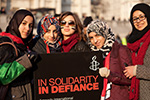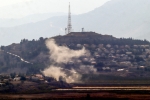The first thing your group will probably be wondering is: where do we begin? There are so many ways for you to contribute to Amnesty International, so let’s start planning!
Plan Your Year
1. Start with a Basic Framework
- What worked well last year? What didn’t?
- Pick some key activities you’d like to do over the year and advertise it at your first meeting.
2. Find Out About This Year’s Campaigns
- Check your September mailing or visit the Amnesty Canada website for a list
- Outline the major actions and events happening this year and the materials available for them.
3. Find Out What Your Group is Interested in
- Are there certain upcoming actions or events that really excite members of your group?
- Are there certain days that your group feels are important to mark (eg. International Human Rights Day of December 10th or International Women’s Day on March 8th? Visit the United Nations website for a list of international days they observe.
4. Collaborate Ideas to Build a Plan
- What are the interests, abilities, and talents of the people joining your group?
- Brainstorm ideas for your group’s work and priorities
- Narrow down these ideas to match the interest, abilities, and talents you have
- Assign roles and tasks and set realistic timelines and workloads. Make sure people can say that they have too much on their plate without feeling guilty.
5. Map it Out
- Draft a plan for your group’s activities and mark it on a calendar to see how they fit
- Don’t forget to include the dates of exams, holidays, and other busy times
- Narrow down these ideas to match the interest, abilities, and talents you have
Organize Events
Now that you know which campaigns and actions your group wants to work on, it’s time to think about the events and activities you will host in your community/school. Make a checklist to track the following:
- The campaign or issue your group will be focusing on for this event (for example, the No More Stolen Sister campaign)
- The date your group has decided on for the event as well as any dates you will need to meet and plan the activity together
- The goals of the activity: is the main point of this to raise money, collect signatures, raise awareness, or a combination?
- Ideas for activities: what will your participants do? How will you make it exciting? What will make people want to attend?
- Key steps for the activity: make a timeline! Set deadlines for your preparations so that everything runs smoothly and on schedule
- Your priority activities: what do you need to do before your event? This may involve bookings, submitting permission forms, publicity, contacting individuals or businesses, and more
- Person(s) responsible: who will be in charge of volunteer recruitment, booking the venue, marketing, and so on?
- Materials required: what will you need to make the event happen? Think about the supplies you will need to buy, stuff you have to make (eg. banners or signs), or other essentials (eg. audiovisual equipment)
- Don’t forget to take notes and evaluate so that you can make your next event an even greater success!
Letter Writing
Amnesty is known for launching highly effective letter-writing campaigns all over the world. Here are a few tips to help you perfect your style.
1. Give the Facts
Use as much information as possible (dates, places, names. Also, cite the article from the Universal Declaration of Human Rights (UDHR) or other convention that has been violated.
2. Follow Amnesty Guidelines
Our letter-writing actions give recommendations or requests – follow these exactly! Don’t ask for things that are not included.
3. Be Brief
Keep it simple Don’t write more than one page.
4. Be Courteous and Respectful
The key to success is to remain impartial. Avoid reference to religious beliefs or political ideologies and refer to the UDHR or other international documents instead.
5. Make it Personal
Write in your own words and give an idea of who you are (i.e. high school or university student) to indicate that your letter is genuine. If you are talking about a specific person, highlight their name.
6. Watch Your Language
Write in the language you feel most comfortable speaking – even if you’re writing to a country where English is not an official language, it may be better than writing in a language that may contain mistakes.
Tabling
To participate in “tabling” is to set up a table covered with information and eye-catching displays for passionate activist (that’s you!) to raise awareness of Amnesty International, its campaigns, and your group’s work with human rights. Use this activity to educate people at public events or to recruit new members for your group!
Make Sure You Have…
- The table/tabling area – don’t forget to confirm that the space you’re setting up in has been reserved for your group
- Banners – aim for simple, clear messages that are positive and easily read from a distance, and remember that duct tape can be useful in a crisis
- General and campaign information – have some general information about Amnesty’s work on hand, such as pamphlets for you to display
- Information about your group – what events will your group be doing? Do you have social media? How can you be contacted?
- Action opportunities – have a simple action, such as a petition or postcard, for people to do as they pass by
- Donation jar – include a note explaining how donations are used for human rights work
- Conversation space – some people may want to ask for more information or engage in a debate, so try to provide a space beside your table
- Tabling skills – make sure that the people behind the table feel enthusiastic, outgoing, and comfortable. Body language is important!












